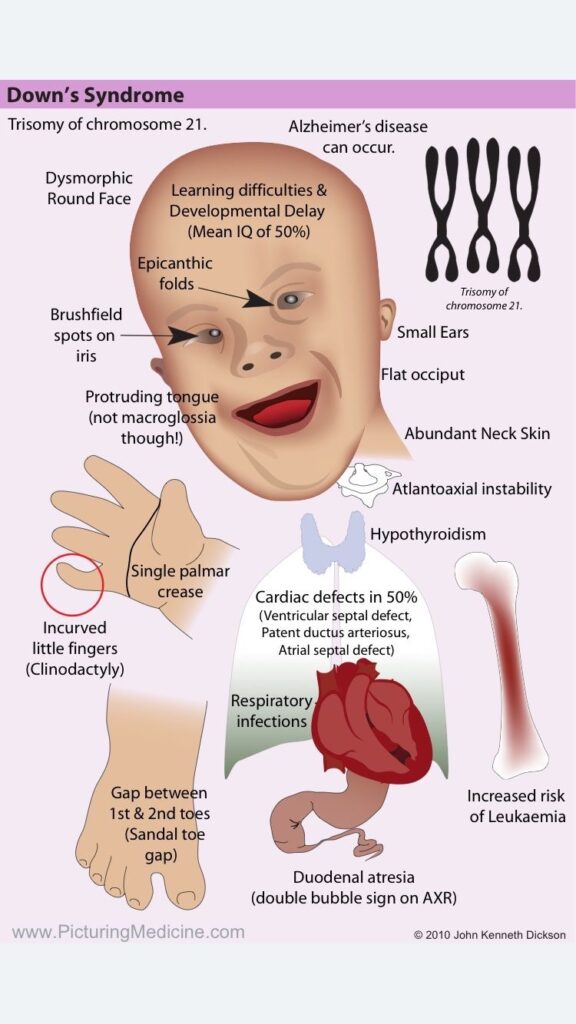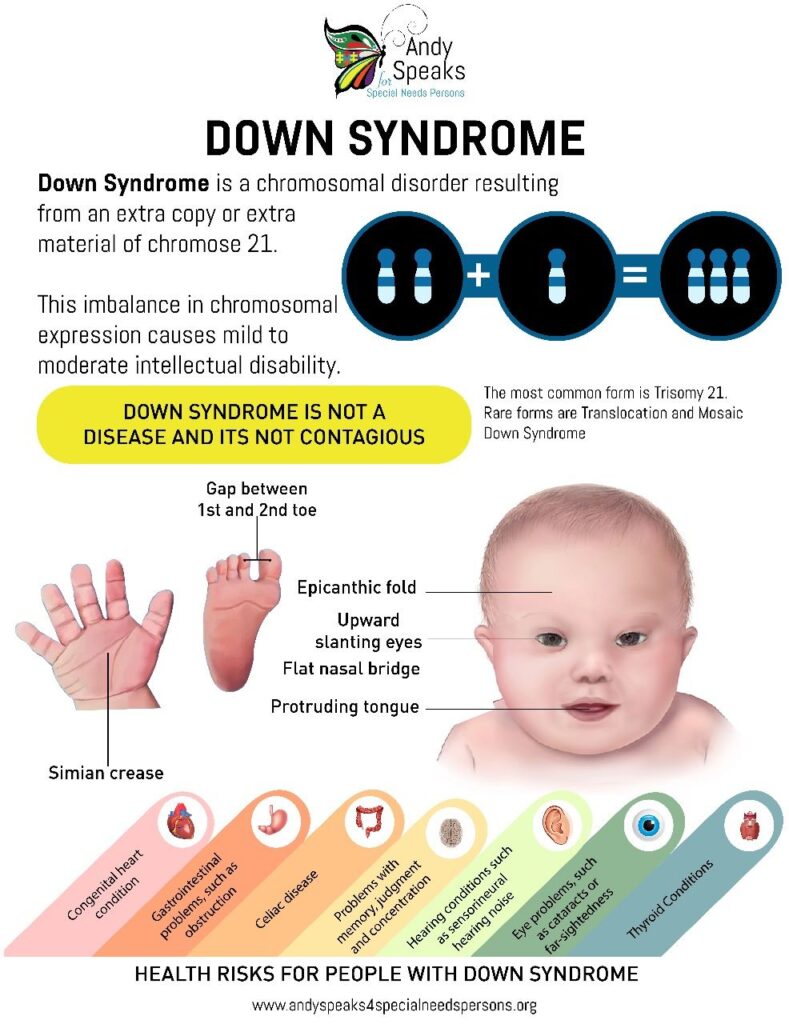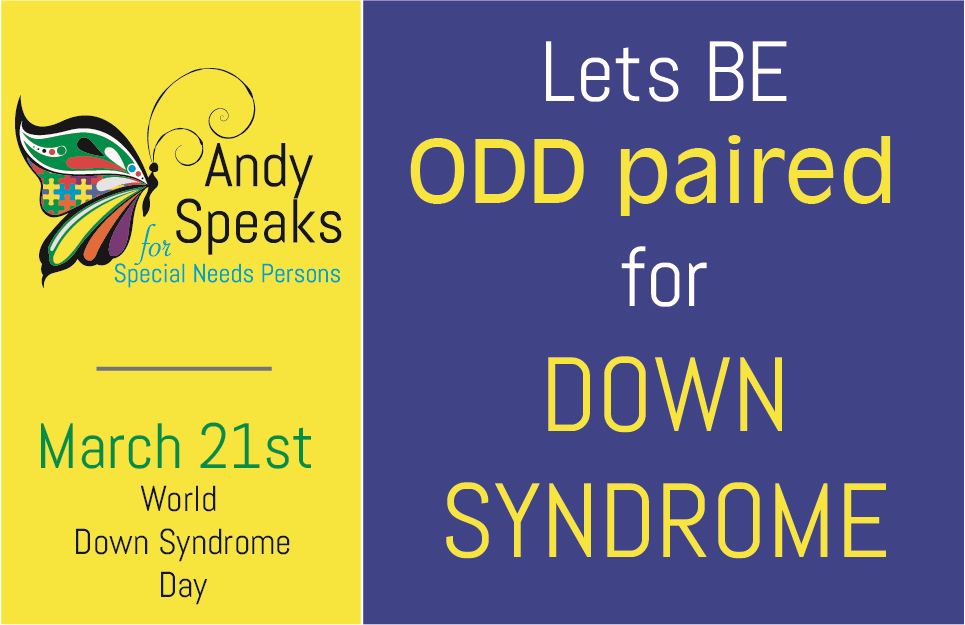INFO HUB
Definition
Down syndrome is a genetic disorder caused by the presence of an extra copy of chromosome 21. This extra genetic material affects the way the body and brain develop, resulting in a range of physical and intellectual disabilities.
Down syndrome can be diagnosed before or after birth, and its effects can vary widely from person to person. Individuals with Down syndrome typically have distinctive physical features which include low muscle tone, a short stature, a flattened facial profile, upward slanting eyes, small nose, and a single crease in the palm of the hand.
People with Down syndrome may also have health issues such as heart defects, hearing problems, and vision problems, experience intellectual disability and have delayed development of language and motor skills.
There is no cure for Down syndrome, but early intervention, appropriate medical care, educational support, and social inclusion, individuals with Down syndrome can reach their full potential. This may include speech therapy, physical therapy, and educational programs tailored to their specific needs. Many people with Down syndrome lead fulfilling lives, and with the right support, can achieve their goals and contribute to society in meaningful ways.
The condition is named after John Langdon Down, the British physician who first described it in 1866.

Types of Down Syndrome

Trisomy 21
This is the most common type of Down syndrome, accounting for about 95% of cases. Trisomy 21 occurs when there is an extra copy of chromosome 21 in every cell of the body, resulting in a total of 47 chromosomes instead of the typical 46.
Mosaicism
This type of Down syndrome occurs when there is a mixture of cells in the body, some with the typical 46 chromosomes and some with an extra copy of chromosome 21. Mosaicism accounts for about 1% of cases of Down syndrome.
Translocation
In rare cases (about 4% of cases of Down syndrome), there is a rearrangement of genetic material between chromosomes 21 and another chromosome, resulting in extra genetic material on chromosome 21. This type of Down syndrome is called translocation Down syndrome.
Management of Down Syndrome
The management of Down syndrome typically involves a multidisciplinary approach that addresses the physical, cognitive, and social-emotional needs of the individual. Some key components of management may include:
Early intervention services, such as physical therapy, occupational therapy, and speech therapy, can help address developmental delays and improve motor skills, communication, and cognitive abilities.
People with Down syndrome may be at increased risk for certain health issues, such as heart defects, hearing loss, and vision problems. Regular medical checkups and screenings can help identify and manage these issues.
Educational programs that are tailored to the individual’s needs can help support learning and development. Special education services may be available through schools or other programs.
Social support can be important for individuals with Down syndrome and their families. This may include access to support groups, recreational activities, and respite care.
As individuals with Down syndrome transition into adulthood, it’s important to plan for their future. This may include vocational training, employment support, and independent living skills training.

TIPS FOR NEW MUMS
For the sake of all new mums:
Things to take care of as concerns our babies.
- Rule out heart defects, see a paed cardiologist
- Thyroid test -important for brain, long bone and muscle development. Very dry skin an indicator of hypothyroidism, see an endocrinologist. One annual TSH/T3/T4 test is recommended.
- Visit ENT to check for adenoids (esp with those frequent infections, stridor(noisy breathing) & poor quality sleep)
- Hearing test to rule out partial deafness at an Audiology center
- Physical and occupational therapy to manage hypotonia and to improve fine motor skills by trained therapists
- Eye tests to rule out visual impairment: refractive errors, cataracts by ophthalmologist
- Speech therapy for the older babies
- Encourage good oral hygiene. Dental cavities, hypodontia see a paed dentist
- Check for Iron deficiency
- Gastro problems i.e GERD, constipation, belly aches, diarrhoea & celiac disease due to gluten intolerance from wheat & wheat products. Seen by a Gastroenterologist. Check that the child has regular toilet motions to avoid accumulation of waste for long periods in the tummy
- Check for undescended testis in boys and have them sorted if they don’t descend voluntarily. Done by paed urologist
Ensure you test for testosterone levels esp in boys going through puberty - Correct umbilical hernias -paed surgeon
- Blood disorders managed by paed haemotologist
- Convulsions need immediate attention by paed neurologist
- Do not ignore any chest congestion, temperature fluctuations or flu symptoms, consult a chest paed immediately
Let us vaccinate the children against influenza and pneumonia annually, mortality rate has been too high. - Do full blood count to check rule out abnormal cells, low Hb etc and also check for mineral deficiencies get tests done at reputable laboratories to avoid wrong results
- Our children take much longer to build proper immunity. Colds, fevers, diarrhea, pneumonia, take them down so fast. Let strive to give them immune boosting foods: uji, vegetables, fruits & nuts, fish oils like scotts emulsion
- De-worm child annually
- Ensure your child gets good sleep especially the REM sleep. Sleep is important for brain development, aids growth, improves immunity, helps the heart, affects weight, improves cognitive function, boosts learning, improves general wellness of your child. Let them have a good sleep routine, do not encourage erratic routines.
- Ensure your child gets enough sunshine to prevent Vit D deficiency and build strong bones.
One of the above could affect your child’s milestones & well being, prioritise and have it managed. Many babies however develop just fine with absolutely no issues.
Lets journey together and LEAVE NO CHILD BEHIND IN 2022


